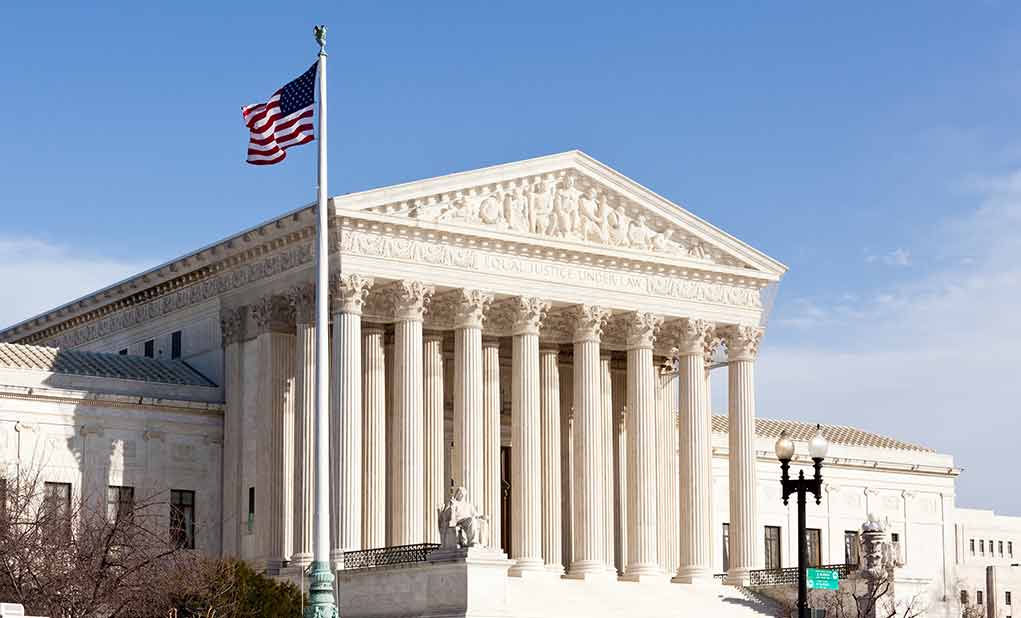In a significant victory for President Trump, the Supreme Court overturned a federal judge in San Francisco who had upheld Temporary Protected Status (TPS) for 350,000 Venezuelans, paving the way for deportations to a crisis-stricken country. The decision is another major step in Trump’s campaign pledge to secure American borders and retake control of a system that many conservatives feel has been allowed to run unchecked for too long.
Trump’s Border Security Victory
The Supreme Court decision represents a critical win for the Trump administration’s immigration agenda, which consistently emphasizes American sovereignty and the rule of law. This ruling correctly restores the executive branch’s authority over immigration policy and foreign affairs, areas where liberal judges have repeatedly overstepped their constitutional boundaries.
The Supreme Court on Monday allowed the Trump administration to strip legal protections from 350,000 Venezuelans, potentially exposing them to deportation. https://t.co/y8t3RiWczO
— PBS News (@NewsHour) May 19, 2025
TPS was initially established by Congress in 1990 to temporarily protect foreigners from countries experiencing natural disasters or civil unrest. The protection, which must be renewed in 18-month increments, has been increasingly abused as a backdoor path to permanent residency, with some nationalities maintaining this “temporary” status for decades.
BREAKING: Supreme Court allows Trump administration to strip legal protections from 350,000 Venezuelans, potentially exposing them to deportation. https://t.co/zutZag36PA
— The Associated Press (@AP) May 19, 2025
Restoring Presidential Authority
Solicitor General D. John Sauer successfully argued that the lower court’s order inappropriately interfered with the administration’s constitutional powers over immigration and foreign policy. The administration has been fighting against judicial activism on multiple fronts, with several emergency appeals to the Supreme Court regarding various immigration programs that have allowed millions to enter and remain in the country outside proper legal channels.
U.S. District Judge Edward Chen had paused the expiration of TPS, citing potential disruption to lives and economic losses without proper legal authority. This type of judicial overreach has become commonplace during the Trump administration, with appointed judges frequently attempting to craft national policy from their benches rather than interpreting the law as written.
Broader Immigration Reform Efforts
The administration’s victory in this case is part of a larger strategy to address America’s broken immigration system through multiple policy changes. Beyond ending TPS for Venezuelans, the administration has sought to end humanitarian parole for immigrants from Cuba, Haiti, Nicaragua, and Venezuela, and has worked to utilize the Alien Enemies Act to deport Venezuelans with gang affiliations.
“Justice Ketanji Brown Jackson said she would have rejected the administration’s emergency appeal.”
The lone dissent from Justice Jackson highlights the ideological divide on immigration issues that continues to define our political landscape. The administration has emphasized that ending TPS does not automatically result in immediate deportation, as recipients may qualify for other forms of relief under existing immigration law.
This ruling affirms the president’s constitutional authority to make difficult decisions that protect American interests while managing humanitarian concerns. The administration maintains that immigration policies must first serve the American people, protecting jobs, resources, and security while addressing genuine humanitarian needs through proper legal channels.
Sources:
https://www.yahoo.com/news/supreme-court-allows-trump-strip-164249419.html
Tweets:
The Supreme Court on Monday allowed the Trump administration to strip legal protections from 350,000 Venezuelans, potentially exposing them to deportation. https://t.co/y8t3RiWczO
— PBS News (@NewsHour) May 19, 2025
Breaking News: The Supreme Court allowed the Trump administration, for now, to remove deportation protections for nearly 350,000 Venezuelan immigrants, who had been allowed to remain in the U.S. under the Temporary Protected Status program. https://t.co/HzoJ2XwefO pic.twitter.com/jBQOWcwMgi
— The New York Times (@nytimes) May 19, 2025
The Supreme Court is allowing the Trump administration to strip legal protections from 350,000 Venezuelans, potentially exposing them to deportation. https://t.co/Fnui342fXU
— Scripps News (@scrippsnews) May 19, 2025
US Supreme Court allows President Trump to strip legal protections from 350,000 Venezuelan migrants, potentially exposing them to deportation – AP pic.twitter.com/W40dR1bgN8
— TRT World Now (@TRTWorldNow) May 19, 2025
The Supreme Court allowed President Trump to strip legal protections from 350,000 Venezuelans, potentially exposing them to deportation. Follow live updates. https://t.co/quWWpxUHMj
— The Boston Globe (@BostonGlobe) May 19, 2025
Supreme Court allows Trump to strip protections from some Venezuelans; deportations could follow https://t.co/3IZ4JW8pkE
— Richmond Times-Dispatch (@RTDNEWS) May 19, 2025
The Supreme Court is allowing the Trump administration to strip legal protections from 350,000 Venezuelans, potentially exposing them to deportation. https://t.co/EunD3S0MDh
— Independent Record (@helenaironline) May 19, 2025
The Supreme Court was asked to strip temporary legal protections from thousands of Venezuelans, potentially exposing them to being deported. https://t.co/hZOU1C6XWe
— KFVS News (@kfvsnews) May 2, 2025
Supreme Court allows Trump to strip protections from some Venezuelans; deportations could follow https://t.co/hiq9zeo3K8
— Globe Gazette (@globegazette) May 19, 2025

